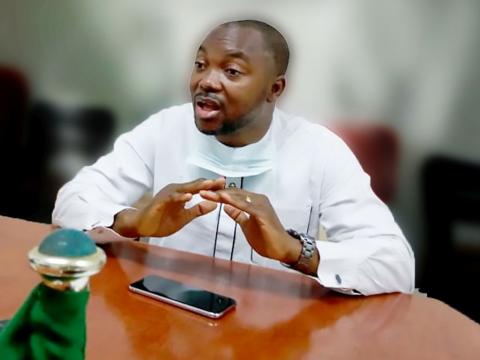By Kemo Cham
Limited funding is hindering response to mental healthcare in Sierra Leone, despite recent gains in the sector, the head of the country’s only mental health hospital has warned.
Dr Abdul Jalloh said the Kissi Psychiatric Teaching Hospital is struggling to cope with demands, particularly with regards medication, a situation that has been worsened by the prevailing Covid-19 pandemic. The specialist psychiatrist added that the hospital also wanted to engage in sensitization and awareness raising about the factors fueling mental health disorders in the country and the negative attitude of the public, which is worsening the condition of people battling mental health issues.
Jalloh was speaking to journalists on Friday in the context of the commemoration of this year’s World Mental Health Day; he said that more investment into the sector was crucial to expand services across the country.
The Kissi Mental Health Hospital is believed to be the oldest of its kind in sub Saharan Africa. And it is the only facility providing mental healthcare in the country, for a population of over seven million people. But over three decades of neglect of the sector saw the facility deteriorated.
About two years ago the government instituted a reform process, and Dr Jalloh is one of two young doctors trained on psychiatry to lead this process. He has overseen the rehabilitation of the facility and the abolition of physical restraining of patients, a major aspect of the reform process.
Mental health units now available in all districts hospitals across the country. These units feed the Kissi hospital with the most severe cases.
The hospital, which is located at Kissy in the east end of Freetown, used to be a 400-bed capacity facility. With the rehabilitation, the bed capacity has been cut down to 250, as a strategy to decongest it, according to Jalloh. The number of patients per ward has been reduced from about 80 to maximum 24, he said.
The US-based health NGO, Partners in Health, funded the rehabilitation exercise, which was concluded in June, leading to the official inauguration of the facility by President Julius Maada Bio that same month.
According to Jalloh, since after that inauguration, the facility has witnessed about 35percent patient inflow, pointing to a rise in confidence level.
But the specialist psychiatrist doctor and his team want to do more, given the prevalence of mental health illnesses in the country.
Figures provided by the hospital show that this year alone, between January and October, it saw over 2000 outpatients. Over 900 patients with more severe cases were admitted, treated and discharged. And as of October 9th, there were 146 patients admitted in the facility.
Jalloh said majority of these are young people, between the ages of 15 and 34, who are there mostly due to substance abuse, notably drugs and alcohol.
“It will surprise you to know that even school children are taking alcohol and drugs now,” he said.
Jalloh wants to embark on outreach exercises as part of awareness raising on the issues. They also intend to establish mobile clinics, which is part of the Ministry of health restructuring process, he said.
In the third quarter of the current financial year, for instance, the center received only Le286million. Of this amount Le86million went for feeding and Le57million for cleaning, both of which services are outsourced by the Ministry of Health.
“This [remaining amount] is very small for our remaining responsibilities,” said Dr Jalloh, in an exclusive interview with Politico.
“Basically the ministry is the main source of funding for us, and then with support from PIH. So the funding is ongoing. It is just that we need more,” he added.
A major challenge of the management of the hospital is to reintegrate patients who have gone through the treatment and are discharged. Jalloh said families are always reluctant to take them back in. This, he noted, causes many patients to go into relapse, due to rejection and the trauma they are subjected to.
Because of this, according to him, 80 percent of the patients currently in the facility have been abandoned by their families, pointing to the existence of stigma to mental health patients.
“The long term plan is to get every mentally ill person out there in the street get treatment; but our concern is who will take care of them after they will have recovered,” said Jalloh.
“With more investment we can decentralize the services and more people can access treatment,” he added.
The psychiatrist want to see the ministry of social welfare assumes its responsibility in terms of caring for patients who have gone through treatment and face family rejection.
There are also the outstanding issues of review of the archaic Lunacy Act, which campaigners say is the basis for a lot of human rights issues faced by people dealing with mental illnesses.
Copyright © 2020 Politico Online








